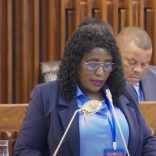Gas boosts foreign investment in Mozambique to €30,074 million in 2024
Time for in-depth analysis of the future of investments in Cabo Delgado, analysts say – listen

French company Total has withdrawn its workers alleging ‘force majeure’, but the government says the project will continue.
The announcement by the French company Total on Monday, 26, of the withdrawal from Cabo Delgado of all personnel working on the US$20 billion natural gas project due to insecurity in the region, has elicited several reactions.
The government has already responded, saying that the company has not abandoned the project, but has merely suspended activities for now, and that everything is being done to restore security in Cabo Delgado.
Experts, however, say that if the company leaves the natural gas exploration project in Cabo Delgado because of the jihadist attacks, it will not be all bad, because northern Mozambique will at least be safer.
For economist Inocência Mapisse, a complete halt to Total’s activities in Mozambique, will, of course, have implications, both positive and negative. “If we consider that the armed attacks in Cabo Delgado are due to the exploitation of natural gas, one can think that the stoppage of this project will also end the violence in that province, and if that is true, it makes perfect sense,” she speculates.
As to its negative implications, Mapisse refers to the fact that Total’s project envisaged several gains for Mozambique, not only in terms of jobs, but also from the point of view of fiscal contribution and attraction of foreign direct investment and “because the paralysis of this enterprise could affect the country’s image”.
For his part, academic Paulo Uache does not think that Total will abandon the liquefied natural gas project in Afungi, but says that, if that happens, “it will not be completely bad, because completely bad is terrorists destabilising the country and making the life of Mozambicans unsafe, in addition to the fact that the company itself has assets to recover from the investment already made”.
Between insecurity and lack of results
In his opinion, gas exploitation should take place as long as the country has security conditions “so that we can take advantage of it, because if this exploitation is done on the terms that it is at the moment, in which the population has to stampede, I do not think that we will be taking an approach to the development of our country, which is the ultimate end, that is, that in addition to security, it is also creating prosperity for the Mozambican state”.
For his part, businessman Assifo Ossumane considers that the analysis of this matter has to be very profound, and that perhaps it is necessary to take the opportunity of the work of Total and all the companies related to oil and gas in Cabo Delgado being paralysed, and the possibility of the French oil company leaving Mozambique, to reflect on whether it is worthwhile proceeding with the project.
Ussumane says that gas has brought a series of promises to the Mozambican people, “but if the consequence of exploiting this resource is not prosperity, is not reducing economic and social inequalities and bringing about better health and education but, on the contrary, is that we have conflict, killing and wars, we as Mozambicans might have to think about whether we are prepared to exploit this resource”.
“Do we have the right institutions, do we have the right skills and competencies, do we have the right leadership?” the businessman asks. “All this has to be rethought, and I think now is the right time to make this reflection.”
Total’s decision and the Government’s response
Meanwhile, the National Petroleum Institute, in the voice of its Chairman of the Board, Carlos Zacarias, says that Total will not leave and that gas exploration in the Rovuma basin, in the district of Palma, will still start in 2024.
Zacarias reiterates that Total has only ‘suspended’ its activities because of the attacks, and that “as soon as the security conditions are restored and improved, I am sure that these activities will be resumed”.
The French major has said that “considering the evolution of the security situation in the north of the Cabo Delgado province in Mozambique, Total confirms the withdrawal of all Mozambique LNG project personnel from the Afungi site”, adding that “this situation leads Total, as operator of Mozambique LNG project, to declare ‘force majeure'”.
The company also reiterated “its solidarity with the government and people of Mozambique and wishes that the actions carried out by the government of Mozambique and its regional and international partners will enable the restoration of security and stability in Cabo Delgado province in a sustained manner”.
Listen to the audio, in Portuguese.












Leave a Reply
Be the First to Comment!
You must be logged in to post a comment.
You must be logged in to post a comment.